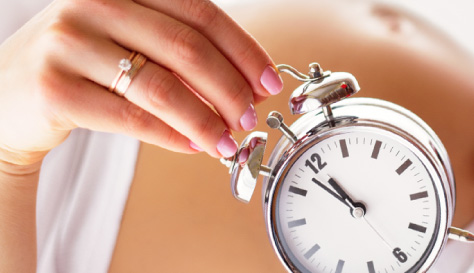You’ve probably spent years trying not to get pregnant.
It’s perfectly normal to think the second you stop using contraception, you’ll be waving a positive pregnancy test and happily picking out nursery furniture. Yet it often takes a few months. So here we talk about how long it takes to get pregnant and the factors which make a difference.
At a glance
- There is only a 25% chance of getting pregnant in each monthly cycle
- The length of time it takes is different for each couple
- Most couples will get pregnant within a year if they have regular, unprotected sex

How long does it usually take to get pregnant?
It often takes a while to get pregnant, but because people often shout about getting pregnant ‘the first time’, we all get a slightly skewed view of what’s normal! In reality, even when everything is working well, you only have a 25 percent possibility of getting pregnant in each monthly cycle. Some couples will get pregnant straight away, while others take several months.
Out of every 100 couples, 20 will conceive within a month, 70 within 6 months, 85 within a year and 95 out of 100 will have conceived within two years.
Two years can feel like a long wait, but it doesn't necessarily mean that you or your partner has any fertility problems.
Why can it take longer to get pregnant?
It’s impossible to say how long it takes to get pregnant because it’s different for each couple. And many factors can affect your chances of conceiving:
- Your age – the older you and your partner are, the longer it will usually take to get pregnant. This is due to fertility starting to decline around age 30 and dropping more after age 35. Male fertility will also drop but over a more gradual timeframe.
- Your overall health – If you’re over or underweight or have a poor diet you may find it harder to get pregnant. Improving your overall health will improve your chances of getting pregnant
- Your reproductive health – If you have a history of reproductive health issues you may find getting pregnant is harder and takes longer
- How often you have sex – the best way to get pregnant is unsurprisingly, to have lots of sex. The more often you have sex the greater your chances of getting pregnant
What are the stats?
Most couples (about 84%) will get pregnant within a year if they have regular, unprotected sex, but age does affect this a lot. While the effect of a man’s age isn’t that clear, we do know women become less fertile as they get older. A recent study of couples having regular unprotected sex found the following:
- aged 19-26: 92% conceived after one year and 98% after two years
- aged 35-39: 82% conceived after one year and 90% after two years
Want to boost your fertility?
If you want to increase your chances of conceiving, there’s a lot you can do to boost your fertility, from having regular sex to learning to unwind.
You’ll want to ensure that you’re eating well and eating foods that can help to boost your fertility whilst keeping you fit and healthy.
It’s a good idea to have a check-up with your doctor to let them know you’re trying to get pregnant. They’ll be able to ask you questions and spot any areas for your lifestyle or health that could affect your chances of getting pregnant.
But remember, most pregnancies happen naturally, so just relax and take your time.
So what does ‘regular sex’ actually mean?
Having ‘regular’ sex means every two to three days. Some couples try to boost their chances of conceiving by having sex when the woman ovulates (releases an egg). Regular sex does help, but planned sex can take the fun out of things and pile on the pressure when you don’t need to.
“Finding out when you ovulate and having sex in your ‘fertile window’ can increase your chances of conceiving,” says Richard Smith, Consultant Obstetrician. “That organised approach suits some couples, but it isn’t for everyone. For example, NICE (National Institute of Health and Care Excellence) doesn’t recommend it because of the stress it can cause. For most couples, the most important thing is to relax and let nature take its course.”
You can find out when your most likely to ovulate by inputting your cycle dates into our ovulation calculator.
When to seek help with getting pregnant
If you’re still trying after a year, it’s probably a good time visit your doctor and ask for some tests. And because fertility declines in your mid-thirties, experts advise anyone over 35 to seek support after six months of trying.
Fertility problems
Fertility problems affect one in seven couples in the UK and the most common causes are problems with ovulation or sperm. Many factors can cause fertility problems though:
- hormonal (endocrine) disorders – like problems with the thyroid or pituitary glands
- physical disorders – like obesity, anorexia or excessive exercise
- reproductive system disorders – like infections, blocked fallopian tubes, endometriosis or low sperm count
Maddeningly, for 25% of couples, fertility problems are never actually explained.
Getting help
If you have been trying for a long time, you can find out more about female and male infertility and discuss fertility treatments with your GP.